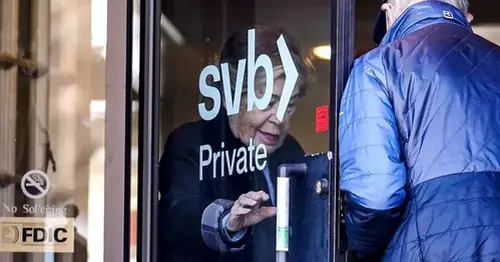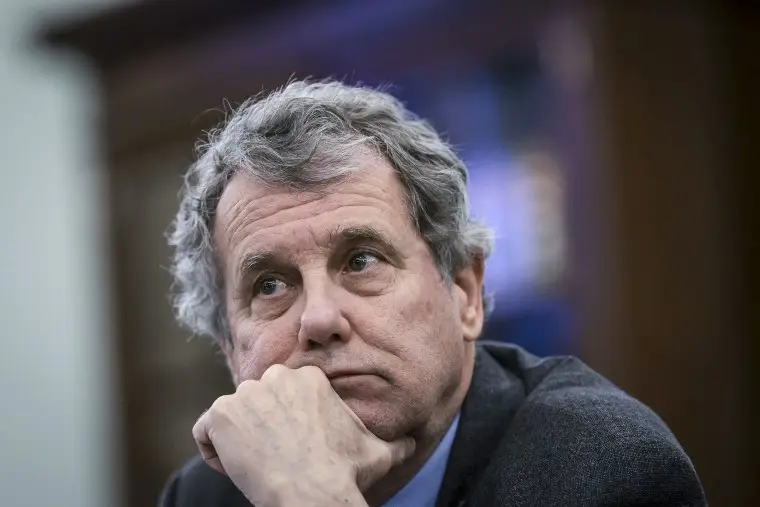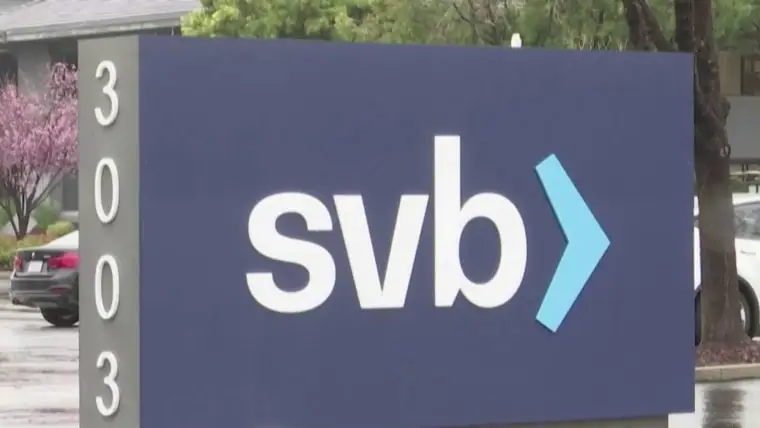
Senate holds its first hearing into SVB and Signature Bank failures
WASHINGTON — The Senate Banking Committee held its first hearing Tuesday into the collapse of Silicon Valley Bank and Signature Bank, featuring a roster of important players in the 2024 election who focused on how the government should respond to two of the largest bank failures in U.S. history.
The hearing, led by Chair Sherrod Brown, D-Ohio, featured Martin Gruenberg, the chair of the Federal Deposit Insurance Corp.; Michael Barr, the Federal Reserve Board of Governors’ vice chair for supervision; and Nellie Liang, the treasury undersecretary for domestic finance.
"We’re left with many questions — and a lot of justified anger —toward bank executives and boards, venture capitalists, federal and state bank regulators and policymakers," Brown said.
First Citizens Bank to buy Silicon Valley Bank deposits and loans
March 27, 202300:33“Just as there are no atheists in foxholes, it appears that when there is a bank crash, there are no libertarians in Silicon Valley,” Brown said. “I hope that from now on, those who have no problem with government intervention to protect their own livelihoods will think a little harder about what their warped version of the free market has done to workers in Ohio.”
Brown also cited the 2018 rollback of enhanced scrutiny for midsize banks like Silicon Valley Bank under the 2010 Dodd-Frank law — a rollback that was led by Republicans, backed by a faction of Democrats and signed by then-President Donald Trump. And he called on regulators to “assess the damage,” impose accountability and “fix what is broken.”

Republicans on the panel put an emphasis on regulators, arguing that they had more tools to stave off SVB's collapse and questioning why they hadn't acted more aggressively.
“If you can’t stay on mission and enforce the laws as they already are on the books, how — how can you ask Congress for more authority with a straight face?” ranking member Tim Scott, R-S.C., asked. “Our regulators appear to have been asleep at the wheel.”
Sen. Katie Britt, R-Ala, said in an interview before the hearing: “The regulators failed here. There were tons of red flags, and I want answers as to why they looked the other way. I mean, sheer indicators show that they didn’t do their job. So this is mismanagement on their part.
“The tools were there, and they weren’t used. I want to know why," Britt added.
SVB's collapse was followed by the failure of New York-based Signature Bank. Since then, the banking sector has sought to restore confidence. A group of 11 financial institutions pledged $30 billion in deposits to help keep First Republic Bank afloat, while in Europe, UBS purchased Credit Suisse for $3.2 billion.
A spotlight on regulators
Barr, the Federal Reserve official, described “the unique nature of this bank” as part of the reason for its collapse and identified a series of issues that were the job of bank managers — not Fed supervisors — to resolve.
“SVB’s failure is a textbook case of mismanagement,” Barr said in his testimony, citing the bank’s “concentrated business model” in technology and venture capital, its rapid growth from 2019 to 2022 and its failure to “effectively manage the interest rate risk” of its securities.
Barr also mentioned the bank’s reliance on depositors who were “connected by a network of venture capital firms and other ties,” adding that “when stress began, they essentially acted together to generate a bank run.” And he said regulators are investigating whether the 2018 deregulation law spurred SVB’s failure.
Under questioning, Barr promised to be forthcoming with Congress if the inquiry finds that tougher laws would have saved SVB.
But Sen. Mike Crapo, R-Idaho, defended that law he led in 2018, leaving little agreement between senators and regulators about the root causes of the failure beyond bank mismanagement.
The panel’s roster is packed with major players in the 2024 election, which deals a wild card when it comes to its response.
Brown and Sen. Jon Tester of Montana are red-state Democrats seeking re-election. Sen. Kyrsten Sinema, I-Ariz., hasn’t said whether she’ll run for a second term. Sen. Steve Daines, R-Mont., chairs the Senate GOP campaign arm. And Scott appears to be gearing up to run for president.
The House will host its own hearing on the bank failures Wednesday, with the same panel appearing before the Financial Services Committee.
Without agreement on the cause of the bank failures, it’s not clear whether Congress will pass a law to prevent more of them in the future. Republicans mostly blame regulators, while Democrats are split between some who support legislation by Sen. Elizabeth Warren, D-Mass., to restore the rules that were repealed in 2018 and others who are reluctant to go there.
Senate Majority Whip Dick Durbin, D-Ill., said Monday the chamber should act to reimpose the enhanced scrutiny on banks, noting that he voted against rolling back the regulations in 2018.







